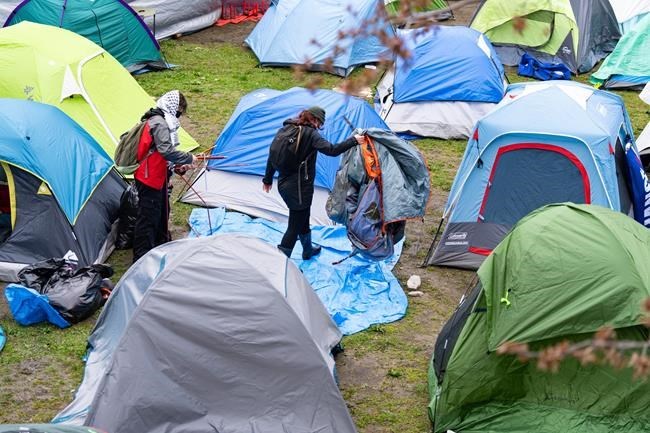MONTREAL — On the fourth day of a pro-Palestinian encampment on the lower field of McGill University, the school said it called police to dismantle the site and two students went to court to suspend protests at the downtown campus.
On Tuesday, a day before summer session classes were scheduled to begin, dozens of tents remained pitched on the muddy ground of McGill's lower field, enclosed by metal fencing erected by the protesters. Banners on the fence carried messages such as, "You are funding genocide."
In an emailed statement, McGill said it asked for police assistance after failing to persuade the protesters to end what the school has called an illegal action. "Police representatives, who have expertise in skilfully resolving situations such as these, have now started their own process," the university said.
Montreal police spokeswoman Véronique Dubuc said the force has received McGill's request to dismantle the encampment and is evaluating "different avenues" to respond.
The encampment, which was erected on Saturday, follows a wave of similar protests on campuses across the United States linked to the Israel-Hamas war. Pro-Palestinian protesters have also set up an encampment at the University of British Columbia's Point Grey Campus and at the University of Ottawa.
The demonstrators in the capital are demanding the University of Ottawa disclose and divest from certain investments.
Students erected tents and tarps Tuesday evening, committing to stay the night.
Nour Hussein, a student volunteer and organizer, said students independently decided to form the encampment to put additional pressure on the university.
“They were tired of the school’s inaction,” she said. “We’re joining a movement all over the world.”
Activists at McGill say they have no intention of dismantling their tents until the school, as well as nearby Concordia University, divests from all companies that protesters claim are "profiting from genocide." The encampment is near the campus gates and does not block access to university buildings.
Meanwhile, a lawyer representing two McGill students argued in Quebec Superior Court on Tuesday for an injunction to stop the protests. Neil Oberman told Justice Chantal Masse his clients "want to go to school without encountering these people."
His application for a provisional injunction asked the judge to order a “restricted area” preventing five pro-Palestinian groups from protesting within 100 metres of every building at McGill's downtown campus for 10 days. The defendants, he said, have created an environment of aggression, hatred and violence for his clients, and the order "will allow for cooling down of emotions."
David Grossman, a lawyer for McGill University, told the court the school is "neutral" on Oberman's injunction request but was "not neutral on the encampment." McGill, he said, wants the encampment removed "and police are instituting their protocols to do that."
Masse asked, "Am I correct in stating that McGill doesn't see the need for an injunction right now?"
Grossman simply replied, "McGill has not applied for an injunction."
Sibel Ataogul, a lawyer representing the union for McGill's law faculty and for the school's student union, told the court that Oberman's application was "abusive."
"I don't even know how it's enforceable," she said. "It's putting an end to the right of protest in a large part of downtown Montreal."
Masse said she would try and provide a written ruling Wednesday morning.
The university's website says classes for its summer session begin Wednesday. The lower field, where the encampment is located, is also where a tent is erected every spring for graduation ceremonies, which are scheduled to begin May 28.
McGill has said that many of the activists, if not the majority, are not members of the school community and that video shows some people using "unequivocally antisemitic language and intimidating behaviour."
A university spokesperson forwarded The Canadian Press a link to a video on X, formerly Twitter, that shows protesters on the McGill campus, some masked, chanting, "Go back to Europe," and "All Zionists are racist." The university called the video very concerning. "We are investigating the incident, including consulting with external legal counsel, to see if what was said falls under protected speech," a spokesperson said.
In response to the news that McGill had asked the police to intervene, encampment participant Ari Nahman said, "The plan is to keep the camp put."
Nahman, who uses they/them pronouns and said they are a student at Concordia, said the people in the video shared by McGill are "not within the camp" but had shown up to join the protest. Still, Nahman, who is Jewish, wouldn't denounce the chants heard in the footage.
"Everyone seems to be offended about something these days," Nahman said, adding: "Antisemitism does exist and it's real; however it can't be conflated with anti-Zionism. I am a Jew and I am anti-Zionist."
On Tuesday afternoon, protesters near the encampment fences huddled under tarps in the cold, pouring rain, chanting "Rain or shine, we will stand up for Palestine!" A woman stood under an umbrella holding a teddy bear doused in red paint, with a sign that read "14,000 children killed" and "Stop the genocide."
Alessandra Renzi, a professor at Concordia University's communication studies department, was at the site Tuesday supporting the encampment's occupants. Renzi said she is not surprised the university called the police.
"This is what universities have been doing all over the world, instead of listening to the demands of students and trying to actually consider what their role in genocide and the murder of Palestinians is."
When asked in Ottawa about the protest, Justice Minister Arif Virani said the situation was "complicated" but that ultimately it was up to McGill to manage it.
“We have constitutionally protected expressive rights, which are important, but there are limits on that expression, which include the fact that you cannot promote hate and you cannot intimidate,” he told reporters.
This report by The Canadian Press was first published April 30, 2024.
— with files from Simon Hopkins in Ottawa
Morgan Lowrie, The Canadian Press




